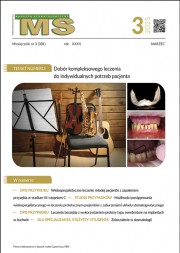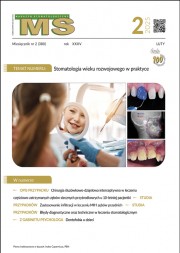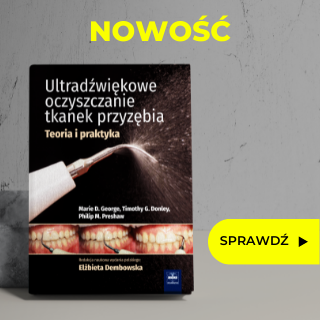Dostęp do tego artykułu jest płatny.
Zapraszamy do zakupu!
Po dokonaniu zakupu artykuł w postaci pliku PDF prześlemy bezpośrednio pod twój adres e-mail.
Full arch rehabilitation treatment options in edentulous patients
Jakub Urban, Tomasz Sypień, Michał Sypień
Streszczenie
Prawidłowe żucie ma fundamentalny wpływ na odpowiednie odżywianie i zachowanie homeostazy organizmu. Estetyka uśmiechu nieodłącznie wiąże się z obecnością zębów w prawidłowych proporcjach i pozycjach. Te dwa elementy są podstawą przywrócenia jakości życia i zdrowia organizmu. Istnieje wiele metod rekonstrukcji brakujących zębów. Dobór odpowiedniej na podstawie badań i odpowiedniej diagnostyki oraz oczekiwań pacjenta jest kluczem do przywrócenia komfortu życia pacjentów bezzębnych.
Abstract
Proper chewing is a basis of proper nutrition and the maintenance of body homeostasis. The aesthetics of a smile is related to the presence of teeth in optimal proportions and positions. These two elements are restoring the quality of life and health of the body. There are many ways of missing teeth reconstruction. Selected methods should be based on proper examination and appropriate diagnostics and also meeting patient expectations. This is the key to restore the comfort of the edentulous patients.
Hasła indeksowe: rekonstrukcje pełnołukowe, proteza zębowa, implant zębowy, bezzębie
Key words: full mouth rehabilitation, dental prothesis, dental implant, edentulous patient
PIŚMIENNICTWO
- Elsyad MA, Hegazy SA, Hammouda NI i wsp. Chewing efficiency and electromyographic activity of masseter muscle with three designs of implant-supported mandibular overdentures. A cross-overstudy. Clin Oral Implants Res. 2014; 25(6): 742-748.
- Zitzmann NU, Marinello CP. Treatment plan for restoring the edentulous maxilla with implant-supported restorations. Removable overdenture versus fixed partial denture design. J Prosthet Dent. 1999; 82(2): 188-196.
- Tjan AH, Miller GD, The JG. Some esthetic factors in a smile. J Prosthet Dent. 1984; 51(1): 24-28.
- Hyeon-Goo K, Kyung-Ho K, Yoon-Hyuk H i wsp. Re-establishment of occlusal plane in a patient with a failed implant prosthesis. J Korean Acad Prosthodont. 2018; 56(2): 141-153.
- Zarb GA, Bolender CL, Hickey JC i wsp. Creating facial and functional harmony with anterior teeth. W:C.O. Boucher, G.A. Zarb.Boucher’s prosthodontic treatment for edentulous patients. Wyd. 10. Louis: Mosby; 1990, s. 382-424.
- Shah S, Azad A, Hassan S i wsp. Association of occlusal plane with the level of retromolar pad. Pakistan Oral and Dental Journal. 2016; 36: 484-486.
- Shigli K, Chetal BR, Jabade J. Validity of soft tissue landmarks in determining the occlusal plane. J Indian Prosthodont Soc. 2005; 5(3): 139-145.
- Shankar YR, Gade N, Gade P i wsp. Determination of occlusal plane parallelism with ala-tragus line and retromolar pad in class i, class ii and class iii individuals. J Res Adv Dent. 2016; 5(3): 61-68.















